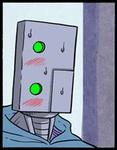|
If I remember correctly their soccer team also is pretty loose for dprk standards, like children from expats in Japan are allowed on the team which pretty much doesn't happen in other orgs. Also I've heard when north Korean women get knocked up by foreign tourists the baby has a high chance of entering their national sports program at an early age, especially since there is no support network for single mothers both from the govt and community.
|
|
|
|

|
| # ? May 17, 2024 09:06 |
|
You mean tourists are left off the hook long enough to have sex with the locals?
|
|
|
|
Uncle Jam posted:If I remember correctly their soccer team also is pretty loose for dprk standards, like children from expats in Japan are allowed on the team which pretty much doesn't happen in other orgs. Japan, like most of the world's nations, does not have birthright citizenship. Those "overseas Koreans" aren't like Italian-Americans, they are legitimately North Korean. Most of them, or more accurately most of their grandparents, chose the north over the south back in the 50s because North Korea was more prosperous back then and that poor choice has been riding them ever since. I've heard different, less cheerful, stories about what happens to North Korean guides who make the mistake of getting pregnant but I'll leave them for some other time. Also I definitely remember that soccer match people are discussing but it might have been back in South Africa 2010 or the 2014 group stages. They were either leading or tied at the half and then Kim Jong Un gave their coaches some "advice" at which point they collapsed in spectacular fashion and it turned into a rout.
|
|
|
|
Doesn't the South Korean constitution let them 'defect' if they wanted to? Or does it not apply to North Koreans born in Japan?
|
|
|
|
It does (well, technically, South Korea does not recognize North Korea as a country and, I suppose, that means all North Koreans are already South Koreans) but most of their friends, family, employers etc are other North Koreans in Japan so you'd basically be walking away from your life to do that.
|
|
|
|
North Korea says its has carried out a live-fire artillery drill simulating an attack on the official residence of the South Korean president.quote:The exercise was overseen by North leader Kim Jong-un, said the KCNA state news agency, who called on the military to be ready to "ruthlessly" destroy the government in South. Stay classy, Kim!
|
|
|
|
North Korea has reached the point where they're just acting like South Korea's crazy ex.
|
|
|
|
Halloween Jack posted:North Korea has reached the point where they're just acting like South Korea's crazy ex. You're just some country that I used to know.
|
|
|
|
So according to Reuters, China is now officially restricting import/export with North Korea: http://www.msn.com/en-us/news/world/china-restricts-north-korean-trade/ar-BBrnEJF?ocid=ansmsnnews11
|
|
|
|
fishmech posted:So according to Reuters, China is now officially restricting import/export with North Korea: http://www.msn.com/en-us/news/world/china-restricts-north-korean-trade/ar-BBrnEJF?ocid=ansmsnnews11 this sounds like a big deal, is this a big deal?
|
|
|
|
Probably still buying all their meth. And the idea that China does/will do what it says it does/will do is funnier than an Archer Marathon for a first-timer.
|
|
|
|
North Korea has tested an ICBM engine (a static test, not an actual launch) The wonks who care about these things aren't so happy with what they see... http://www.armscontrolwonk.com/archive/1201278/north-korea-tests-a-fancy-new-rocket-engine/ quote:First, the rocket plume appears to be exiting from two nozzles. That would suggest a pair of engines. (NB, of course North Korea isn't going to nuke the US. This is about establishing deterrence).
|
|
|
|
Demiurge4 posted:You mean tourists are left off the hook long enough to have sex with the locals? life finds a way
|
|
|
|
South Korea has just announced two defections which took place last year - a North Korean diplomat posted in Africa, plus an (apparently senior) Colonel from the Army's General Reconnaissance Bureau, responsible for espionage against the South. http://www.reuters.com/article/us-northkorea-defectors-idUSKCN0X80CV
|
|
|
|
No posts in the DPRK thread for Kim Il-Sung's birthday? I'm thoroughly disheartened. Also North Korea tried to launch a couple of ICBM today in reverence of Eternal Leader. http://www.reuters.com/article/us-northkorea-missile-idUSKCN0XC010
|
|
|
|
And, not that anyone noticed, but South Korea's ruling party just not only lost its legislative majority but actually (barely) came in second behind the main opposition group in their legislative elections.
|
|
|
|
Cliff Racer posted:And, not that anyone noticed, but South Korea's ruling party just not only lost its legislative majority but actually (barely) came in second behind the main opposition group in their legislative elections. I don't follow Korean politics, so could you elaborate on the implications?
|
|
|
|
Well, South Korea is like the US in that its got a president, who is still in office, even though her party is now the minority in the Korean parliament. There's actually multiple left-ish parties so the fact that they are only behind by one seat (yeah it was a real close one) is actually far worse than it sounds. This basically means that she will have trouble getting her economic agenda passed. If all you care about is NK/SK relations not much will change immediately buy it has big effects on economic and social policy and all. And of course maybe she'll work out some sort of corrupt bargain or whatever, I don't really follow Korean politics well enough to say. This is also very unexpected, most people thought that the Saenuri party would loose seats, and maybe even lose their majority, but actually coming in second was not what people expected to occur.
|
|
|
|
Cliff Racer posted:And, not that anyone noticed, but South Korea's ruling party just not only lost its legislative majority but actually (barely) came in second behind the main opposition group in their legislative elections. The government was blocking comments on news sites in the days leading up to the elections. Libel laws are seriously so bad here. Even if what you're saying is 100% true, if the other party can prove ("prove") damages resulted, you can be sued. I guess they have pretty different issues than the US as far as voting; my Korean boss told me that voting itself is very easy, so voter registration might be less of a hindrance. The Orwellian freedom of speech/information issues still really bother me a lot though. http://www.sandiegouniontribune.com/news/2016/apr/11/online-curbs-limit-south-korea-pre-election/ http://www.nytimes.com/2012/08/13/world/asia/critics-see-south-korea-internet-curbs-as-censorship.html?pagewanted=all&_r=0 <-- older
|
|
|
|
.
sincx fucked around with this message at 06:32 on Mar 23, 2021 |
|
|
|
sincx posted:http://uk.reuters.com/article/uk-northkorea-missile-idUKKCN0XC00Q I expect they have an "understanding" with many of Kim's generals already. It's definitely strong language from China, but the target audience is almost certainly its partners in the Six Party Talks, meant to reassure their governments that Beijing's not loving around. I'll admit, I'm pleased to hear them say it.
|
|
|
|
I'll be pleased when they're footing the bill.
|
|
|
|
Yeah, well, don't hold your breath on that one. At this point I'm just glad that everyone else in the world seems to not be too keen on Pyongyang having more nukes.
|
|
|
|
Cliff Racer posted:Well, South Korea is like the US in that its got a president, who is still in office, even though her party is now the minority in the Korean parliament. There's actually multiple left-ish parties so the fact that they are only behind by one seat (yeah it was a real close one) is actually far worse than it sounds. This basically means that she will have trouble getting her economic agenda passed. If all you care about is NK/SK relations not much will change immediately buy it has big effects on economic and social policy and all. And of course maybe she'll work out some sort of corrupt bargain or whatever, I don't really follow Korean politics well enough to say. Isn't south Korea weirdly socially conservative? I remember reading they have a bunch of morality laws and stuff. Majorian posted:I expect they have an "understanding" with many of Kim's generals already. It's definitely strong language from China, but the target audience is almost certainly its partners in the Six Party Talks, meant to reassure their governments that Beijing's not loving around. I'll admit, I'm pleased to hear them say it. I assume south korea/japan/the US have anti-icbm defense? I doubt NK would actually do anything, but still.
|
|
|
|
Dapper_Swindler posted:I assume south korea/japan/the US have anti-icbm defense? I doubt NK would actually do anything, but still. The U.S. and Japan have Aegis BMD capabilities. I'm about as anti-missile defense as it gets most of the time, but when it comes to North Korea, I think it's justified, especially when it's on such limited platforms as surface ships.
|
|
|
|
Dapper_Swindler posted:I assume south korea/japan/the US have anti-icbm defense? I doubt NK would actually do anything, but still. There is point defence such as Aegis in South Korea and Japan, but it depends where the rocket is going and what type of rocket it is. It's impossible to intercept an ICBM/ Space Launch Vehicle during boost phase. (when NK launched a satellite a few months ago, there were a lot of people saying 'well why doesn't the US shoot down the rocket?'. I'm afraid that's literally impossible with current technology).
|
|
|
|
mediadave posted:I'm afraid that's literally impossible with current technology).
|
|
|
|
Rent-A-Cop posted:Boost-phase intercept is technically feasible but logistically very difficult Boost-phase is also politically and diplomatically hazardous ground. CSIS has a good piece on it, and I particularly love it because this is the photo they used:  Now, I know that's the way a missile looks while it's being launched, but to me it looks like the missile was just standing there and then suddenly caught on fire and started tipping over. It's a good metaphor for the program.
|
|
|
|
Hey guys. I've been doing some research into the history of the North Korean nuclear conflict and I think I found an interesting synopsis. It's gonna be a big series of writeups but I think it's pretty interesting. So here we go: Clinton administration was able to negotiate with North Korea in denuclearization in the First Nuclear Crisis (thanks to Jimmy Carter): Pretend you're a North Korean government official for a moment. It's the early 1990s, and the communist governments of Eastern Europe and the Soviet Union have collapsed. You're the last Soviet-style Communist dictatorship left standing, and you're struggling to keep your nation together. Without economic aid from the Soviet Union energy imports have thinned to a trickle. The economy is collapsing around your ears. Everything is hosed. Food shortages have been plaguing your country for years. The coal mines that helped prop up your economy have flooded. To operate the pumps to clear the mines you need electricity, but you need coal from your mines to help power the pumps. With the Soviet Union gone you've turned to China to be your new economic sugar daddy, but just recently China has experienced grain shortfalls and its own economy is floundering. The Middle Kingdom can no longer help you with everything you need. This is the position North Korea found itself in when it butted heads with the rest of the world and the First Nuclear Crisis came to pass. At the time North Korea was a member of the international nuclear weapons Non-Proliferation Treaty (NPT). Problem is by 1992, inspectors found inconsistencies in paperwork that indicated the DPRK was refining plutonium. This is a big deal: unlike uranium-235, plutonium is much easier to refine into weapons-grade fissile material: the infrastructure, energy, and time requirements to refine plutonium are much less onerous, so plutonium would be the fuel of choice for a nuke (this distinction becomes important later on). Being caught with their pants down was a huge embarrassment, and initially the DPRK got skittish and withdrew from the NPT. However, to keep things from escalating into a full-blown crisis North Korea reached out to the US to negotiate a settlement. Initially, then-President Clinton had hoped the DPRK would collapse before they had to make any agreements, but he soon recognized that if it didn't the old cyclic stalemates of threats and crises would come to a head, possibly with disastrous consequences. Thankfully Clinton had Jimmy Carter on hand to hammer out a deal that would appeal to both sides, and this became known as the Agreed Framework. Overall, there were three broad stipulations: 1) The DPRK would decommission its plutonium production sites, 2) The US would help meet the DPRK's energy needs, and 3) The two countries would normalize diplomatic and economic relations. One very important stipulation concerning US aid is important to remember: To provide electricity for the DPRK, the US would help construct two light-water nuclear reactors (LWRs). LWRs run on low-grade uranium, enriched to only 2.5-3.5% U-235. Weapons-grade uranium however requires enrichment to more than 90%. Thus, Pyongyang would get the benefit of having nuclear power, without the capability to build a uranium-based fission bomb. Given the dire situation North Korea found itself in, there was a lot of pressure to try and play nice with the rest of the world. Thus the First Nuclear Crisis of North Korea ended peacefully. Sort of. The economic aid promised to North Korea stalled, in part because the Republicans seized control of Congress in 1994, and their less-than-conciliatory attitude towards North Korea made it harder to secure funds. The East Asian Financial Crisis of 1997 didn't help things either. As usual the DPRK would occasionally behave like belligerent assclowns when things didn't go their way, which hampered further progress. Yet slowly but surely the light water reactors were being built, and the DPRK was complying with its commitments to shut down plutonium production. Overall, the Agreed Framework was a creaky but functional foundation for US-DPRK diplomacy. It's important to note that the Agreed Framework wasn't a treaty, but instead a non-binding Executive agreement between the two nations. And as Tom Cotton mentioned in his letter to Iran in 2015, in a Democracy like America's, the next president in office can easily gently caress over a previous administration's deals if they aren't ratified by Congress. Bush does a 180 and crafts the Bush Doctrine and the “Hawk Engagement” strategy: When Bush entered the scene North Korea had started to foster better relationships with other countries. Most notable is the Sunshine Policy of the Kim Dae Jung administration, which offered nigh-unconditional economic aid to North Korea. If the DPRK survived ten years after the Soviet Union collapsed, it was apparently going to stick around for the long run, so the idea was to encourage North Korea to soften their attitude to their southern neighbors. More cynically, the Sunshine policy may have been a way for the South to prevent the refugee crisis that would've occurred if the North did collapse. But then 9/11 changed the international landscape, and the US had George W. Bush holding the reins. Unfortunately, Bush lacked the nuance, caution, or sober realism that Clinton had, and adopted a much more hardline approach when dealing with North Korea. As professors David C. Kang & Victor D. Cha would later note, “Emotion and ideology have often interfered with the reasoned study of North Korea, and this has led scholars and policymakers to consistently overestimate the North Korean threat and to misunderstand the motivations behind North Korea’s actions.” Now it was clear that Bush (justifiably) despised North Korea for its grotesque human rights violations, and by extension he held similar derision towards conciliatory agreements with the DPRK. The Sunshine Policy was on his major shitlist, and his disdain for the previous administration's approaches fueled his preference for policies that were “Anything But Clinton” (ABC). Bush wanted North Korea to collapse and for a democratic regime to take its place. The “Bush Doctrine” as it came to be called composed of four core ideas: 1) The US is locked in a global war against enemies who are unified by a common hatred for democracy, 2) The US had the right to take unilateral action against its enemies, 3) The US has the right to commit preemptive strikes to prevent foreign threats from materializing, and 4) Regime change is the ultimate goal for fostering world peace. Ultimately, Bush saw the world as being divided among two lines: the nice friendly democratic/capitalist nations, and the evil dictators who hate freedom. America would lead the good guys in a charge against the bad guys, and Bush would be holding the banner. He didn't seem to see world politics as it really was: composed of a multitude of nations each with their own interests and a complex mesh of attitudes towards others to meet those interests. Even before the US started talking about regime change it was clear that China, Russia, and South Korea would've been highly against such a destabilizing event in their neighborhood. The inability to recognize this would later cripple the Six Party Talks. This hardline, demanding, and aggressive policy for DPRK diplomacy that the administration would adopt came to be known as Hawk engagement. Its ultimate goal was not to achieve peaceful resolution, but to incite the DPRK into doing something stupid and give us a reason to punish them either through military action or isolation and collapse. While no one can fault Bush's good intentions in wanting to take down a brutal dictatorship, the conception and execution of his policies were so short-sighted and bumbling that they would undo eight years of diplomatic successes and lay the foundation for the clusterfuck we have now. A consistent tactic that Bush seemed to use was issuing demands that were impossible for North Korea to accept, possibly with the hope that the DPRK would reject any sort of agreement outright and make the US look like the reasonable party in comparison. This would be used as leverage with other foreign powers to further isolate and contain the regime. If you know your history, this tactic shares strong similarities to the list of ultimatums Austria issued to Serbia in response to the assassination of Archduke Franz Ferdinand: make unreasonable demands while suing for peace, and when Serbia is forced to reject them Austria could just say to the world community “Hey, we TRIED to do this through diplomacy, we have no choice to crack down on their asses now.” And nothing ever went wrong.
|
|
|
|
ShadowCatboy posted:Words Dude, killer write-up! Do you think you're going to go into other parts of Korean history after this?
|
|
|
|
Savidudeosoo posted:Dude, killer write-up! Do you think you're going to go into other parts of Korean history after this? Honestly that's just two parts of a seven-part synopsis. I'm editing the rest of it right now.
|
|
|
|
North Korea's uranium enrichment program becomes a point of contention: Bush entered into his second year in office with America still reeling from 9/11. In his State of the Union address, he infamously described North Korea as being part of an “Axis of Evil” along with Iran and Iraq, none of whom had anything to do with 9/11. North Korea was understandably pissed with this portrayal, but despite this hoped to move forward with the commitments outlined in the 1994 Agreed Framework: provide proof that their Yongbyon plutonium processing plant had been shuttered, and in exchange they get energy assistance. Yet by March Bush took the unusual step of refusing to certify North Korea's compliance with denuclearization efforts, while affirming that the US would continue its oil shipments to North Korea. It's possible that this was a clumsy attempt to placate two different bodies of power: on the one hand Bush wanted to throw a bone to neoconservatives who wanted to see a firmer hand being used with a Communist dictator, but on the other he needed to ensure the East Asian nations that America was keeping up with its commitments. By this point Kim Jong Il had been doing his best to rehabilitate his country's image. The Sunshine Policy had laid the groundwork for cooperation with the South, while diplomatic channels with Japan were opening up to the extent that Japanese Prime Minister Koizumi Junichiro would later visit Pyongyang that year. The refusal by the US to acknowledge that North Korea was playing nice with the Agreed Framework was a slap in the face. What happened next though would spark the Second Nuclear Crisis with North Korea, and push the DPRK towards its current nuclearization efforts. In June of 2002 evidence was made public that North Korea had been refining uranium. In truth, evidence of uranium enrichment had been uncovered since 1997 under Clinton, and this was flagged for the next administration to keep an eye on. The Bush administration of course interpreted this as North Korea attempting to generate weapons-grade fissile material and importing Pakistani technology, but it's important to remember that uranium enrichment (so long as it wasn't for nukes) technically wasn't prohibited in the original Agreed Framework. Plutonium, being much easier to refine, was banned. While no one can say for certain why the DPRK was processing uranium, it is quite possible that the program was innocuous, and the DPRK may have simply been trying to meet their own energy needs. The Light Water Reactors that were still under construction required uranium enriched to 2.5-3.5% (low-enriched uranium, or LEU), while weapons-grade uranium-235 had to be enriched to 90+% (highly-enriched uranium, or HEU). This is a huge difference, and while the former was more possible with the DPRK's infrastructure, the latter would require a great deal of time, reliable electricity, and components to develop. Indeed, as Selig Harrison (Director of the Asia Program and Chairman of the Task Force on U.S. Korea Policy) noted: 1,300 high-performance centrifuges would have to operate full time for three years to make the 60 kilograms of fissile material needed for a basic ("gun-type") nuclear weapon. Accomplishing that would require an enormous sustained input of electricity, without fluctuation or interruption. Moreover, the operation of a multi-centrifuge "cascade" requires a high-powered motor with a speed twice that of a MiG-21 jet engine. North Korea cannot produce engines even for its Russian-supplied MiGs, and it has only limited, highly unreliable electricity capabilities. It is therefore unlikely that the country is able at present to build or operate the equipment needed, over a long period, to produce weapons-grade uranium. So this was the question the Bush administration faced: was North Korea trying to process LEU so they would not be dependent on the US for their energy needs once the promised Light Water Reactors were up? Or were they trying to cheat around the Agreed Framework to hoard fissile material for a clandestine nuclear weapons program? Figuring this out would require caution and subtlety. Unfortunately as we would later see with Iraq, the Bush administration had a habit of grabbing raw intelligence from the CIA before intelligence experts could sort out what was reliable and what wasn't. With fresh evidence that North Korea was refining uranium and a recent naval skirmish escalating tensions in the region, in September of 2002 the US extended an invitation to the DPRK to discuss the matter. Pyongyang accepted the invitation in less than a day, apparently eager to resolve the issue through diplomacy. Misinterpretation, misunderstanding, and namecalling catalyzed the Second Nuclear Crisis with the Kelly Meetings: On October 3 Assistant Secretary of State for East Asian & Pacific Affairs James Kelly was to meet North Korean official Kang Suk-ju to discuss the uranium enrichment program they had. Whereas Carter had used a softer and more flexible approach in dealing with Pyongyang officials, Kelly went into the meeting with a scripted message demanding an immediate halt to the uranium enrichment program before any other negotiations could occur. Now let's pretend you're the North Korean negotiator Kang. Suppose the uranium enrichment program is just to produce LEU for reactor fuel. You go in, wanting to assuage any US anger and fear that you've violated the Agreed Framework. Or maybe your country really has been secretly hoarding a small stash of weapons-grade uranium, to act as a counterweight to your vastly inferior military. Suddenly this dude from America is getting all up in your face and laying down ultimatums. Your hackles rise. It's just not fair! Your country had complied with the stipulations in the Agreed Framework, even though the US President refused to certify your cooperation. On their end, construction on the LWR reactors the US promised was running late. And even after all that Bush had the gall to name North Korea as a part of the “Axis of Evil.” You perceive a threat from the US, a country that has just recently invaded Afghanistan and you know they're just itching for a fight. So what do you do? You can't back down from this threat and seem weak, nor can you issue any threats of his own. So you do what what North Korea has always done: obfuscate. As Sun Tzu said: All warfare (including negotiation) is based on deception. Hence, when able to attack, we must seem unable; when using our forces, we must seem inactive; when we are near, we must make the enemy believe we are far away; when far away, we must make him believe we are near. This was probably going through Kang's mind when he angrily rebuked Kelly. Unfortunately, differing transcripts of the meeting leave it unclear exactly what Kang said and what he meant, but Kang Suk-ju had two main points: 1) The DPRK had the right to pursue nuclear weapons to protect itself from the US, and 2) Pyongyang needed an “even more powerful weapon” to face off against the American military. It's important to note that nothing Kang said here is an explicit admission that the DPRK had an active nuclear weapons program. Pyongyang has always tended towards a “neither confirm nor deny” (NCDC) approach when it comes to its military potential, and these statements were perfectly consistent with their bluff-and-bluster style of negotiation. It was very likely that Kang was just puffing up and standing on his hind legs to look more threatening in response to Kelly's aggressive stance. This was the second major blunder of the Kelly meetings. Where a more savvy diplomat would have noted that Kang was likely using scare tactics as a leverage, the Bush administration took his statements at face value. This was an absolute disaster. North Korea came away pissed off that Kelly had acted in a “highly arrogant manner” and accused Washington of violating the Agreed Framework by issuing threats against the regime. The US came away thinking that North Korea had an active nuclear weapons program. Two weeks later, Washington would announce that North Korea was building WMDs despite the lack of evidence. North Korea would repeatedly deny this charge afterward, but they were drowned out by the voices of the hot leggy blondes on Fox News howling that the DPRK had been cheating on the 1994 agreement all along. Soon afterward, Pyongyang would reach out to the United States wanting to negotiate a “grand bargain” to meet the interests of both parties, but was rejected by Washington. The situation rapidly escalated from this point. Claiming that North Korea had violated the Agreed Framework, Bush halted fuel shipments to North Korea. In retaliation, North Korea removed monitoring devices, expelled inspectors, and started processing plutonium again which generated a real nuclear crisis. Where it would've taken them 2-3 years to process enough uranium for a bomb, they needed a mere 6 months to process an equivalent amount of plutonium. Washington freaked out in response and the news media claimed that North Korea was “intent on pushing this stand-off to the brink.” By early 2003 Pyongyang tried to reach out and resolve things through diplomacy again, but Bush rejected this offer and halted grain shipments to North Korea. It's very clear from this that the Kelly Meetings were botched. The issue of North Korea's uranium enrichment program had a big question mark behind it that could've been easily resolved. Yet Bush's strategy of hardline “Hawk engagement” made this impossible. Even if North Korea was indeed skirting the line and trying to refine weapons-grade uranium, the Agreed Framework provided the diplomatic basis that would've allowed inspections and resolution. By casting it aside, the Bush administration had sparked the Second Nuclear Crisis. Yet perhaps this wasn't just a product of incompetence born from a simplified black-and-white view of world politics. It is quite possible that Washington deliberately misinterpreted Kang's statements. Indeed, if the Bush administration were truly savvy, this may have been the conflict they were hoping for. Maybe Bush did this to stop the DPRK from generating its own LWR fuel so it'd have to be dependent on the US for its energy needs. Or maybe he wanted to ignite a conflict to halt the diplomatic progress the DPRK was making with South Korea and Japan and put America back in the heart of dealing with North Korea. Or maybe Bush was trying to get the DPRK to do something stupid and give America cause to crack down even harder. Whether it would play out as he liked would be seen over the next several years.
|
|
|
|
China stepped in to try and mediate, but USA's hardline ultimatums turned it into a Mexican Standoff: By this point the Bush administration was trying to build a coalition of nations to oppose North Korea using the still-not-confirmed reports of WMD buildup as a basis, much as they did with Iraq. In early 2003, diplomats were sent from the US to meet world leaders with the (still unsubstantiated) claims that Pyongyang had been stockpiling HEU since 2002 in violation of the Agreed Framework. Their mission was to encourage these nations to place sanctions against the DPRK. The onset of the Iraq War on March 20, 2003 suggested that Bush was on a mission to topple unsavory regimes worldwide. Not wanting a similar fiasco to occur near their borders, China stepped in the following month and offered to mediate a settlement between the US and the DPRK. After giving North Korea the cold shoulder for the past several months the US agreed to send James Kelly over again to talk to them. The North Korean negotiators appeared to want to work from the Agreed Framework. Their demands included: 1) A pledge of nonaggression from the US, 2) A reopening of diplomatic relations, 3) Economic aid, and 4) Completion of the promised LWRs and compensation for the delay. Now obviously the US wanted North Korea to shut down their nuclear weapons pursuits, especially the plutonium refinement that had been restarted when US-DPRK tensions peaked the previous year. Yet instead of working towards this goal through a process of negotiations, Kelly opened with his counter-offer, which was essentially “Sure we can offer economic aid, but you must COMPLETELY dismantle your nuclear program before we can talk about anything else.” Dismantle first, dialogue later. By this point North Korea's trust in the United States had worn incredibly thin, and Kim Jong Il's regime began to see real compromise with Bush as nigh impossible. Not only had Bush tried to economically strangle the DPRK with the clear goal of encouraging a collapse, the onset of the Iraq War indicated that Bush was not a man who could be reasoned with. If the nation they're trying to engage with feels it has the right to launch preemptive attacks, Kim's regime felt it was justified to beef up any military capabilities they had as a deterrent. For Kim, the threat of nuclear weapons was the only thing keeping the US from invading North Korea like they did with Iraq. In essence, the two nations were locked with a gun to each other's heads. In demanding North Korea scuttle their nuclear weapons program before they could even talk about anything else, Kelly was essentially saying “You put yours down first, and THEN we'll talk about whether I should put mine down.” Clearly the DPRK wouldn't surrender their nuclear projects without assurances from the US that they wouldn't be attacked. Yet even with North Korea refusing, political and military tensions continued to build as the Iraq War continued and the Saddam Hussein regime was deposed. Six-Party Talks begin, but not everyone is on board with the USA: Iraq was toppled in less than a month, and America had proved its ability to crush foreign nations' standing armies. North Korea saw what they were facing: a formidable military power hell-bent on the destruction of its foes, regardless of whether they cooperated or not. After all, Iraq had tried to comply with all of Bush's demands. They'd allowed weapons inspections to resume. In November of 2002 they had submitted a 11,800 page report to the UN security council detailing their lack of WMDs. The Kim regime was under a great deal of pressure to negotiate a solution, and so they finally agreed to one of Washington's demands: multilateral negotiations. Now North Korea had resisted the call for multilateral negotiations for months. It was difficult enough to hold off the United States on its own. Now North Korea also had to face multiple countries from East Asia as well. The series of conferences known as the Six Party Talks would involve the nations most affected by this fiasco: the United States, North Korea, China, Russia, South Korea, and Japan. Yet if the US was hoping to build a coalition to browbeat the DPRK into submission, it was sorely disappointed. South Korea was justifiably furious, as it was still operating under the Sunshine Policy and Bush's Hawk Engagement approach had threatened to overturn the state of relatively peaceful coexistence between the two nations. They along with Russia and Japan also suspected that Bush was trying to fan the flames and force a military confrontation as he had done with Iraq. China, while not as openly frustrated with the United States, was the most vehement in opposing regime change due to the massive destabilization that would result in the region. In China's view, the Agreed Framework had been a success until the US abandoned it, and without such a diplomatic foundation to build on negotiations with North Korea were severely hampered. Bush's hardline approach of demanding disarmament before any further negotiations could even be discussed was insane, and China wanted the US representatives to put forward more modest, serious proposals to the DPRK. Needless to say, with so much going against the US building a full East Asian coalition was impossible. Months dragged on with no success in getting either side to relent, and this only gave North Korea the time it needed to build a plutonium-based bomb.
|
|
|
|
Okay last bit: The downward spiral continues, and the lasting damage from Bush's Hawk Engagement strategy lasts to this day As the world rang in 2004 Bush clung to the ultimatum that there would be no concessions until North Korea fully dismantled its nuclear program and international inspectors could verify it. Yet by this point Bush's bargaining position had weakened considerably. Iraq was beginning to turn into a quagmire, and 12,000 US troops had to be moved from South Korea to Iraq, and the American presence at the DMZ thinned. On the surface Bush softened his approach by the third session of the Six-Party Talks in June of 2004. Instead of requiring North Korea to dismantle its nuclear program first, US negotiators wanted the DPRK to simply make a commitment to dismantle. In exchange, the United States would offer a provisional guarantee to not attack. This might have been sufficient to relieve some of the building tensions between the two nations, if it weren't for the additional provision that the DPRK “first admit to the existence of the alleged uranium-enrichment facilities and specify where they are located.” This demand that North Korea confess to an HEU program became a consistent and trend in how the Bush administration negotiated with North Korea. Remember, this whole fiasco started because of the Kelly meeting in 2002, where the United States jumped the gun and accused North Korea of refining HEU without any hard evidence. Before this there was heavy indication that North Korea was complying with the Agreed Framework in dismantling its plutonium refinement program and trying to normalize diplomatic relations with the rest of the world. With mounting evidence that the United States had made unfounded allegations of WMDs in Iraq, Bush may have included this last provision demanding the DPRK fess up in the hopes that an admission of an HEU program in North Korea would help keep him from looking like a complete assclown. If North Korea didn't have that HEU program in 2002, the Bush administration would've made false WMD claims not once, but twice. Needless to say, the DPRK rebuked this as a “sham offer” and demanded future discussions to exclude any mention of HEU. They would later refuse to join the next round of Six-Party Talks. Ironically, as 2004 rolled on North Korea apparently hoped for a regime change in the US. Yet any hopes that a more reasonable incoming president were dashed when Bush was reelected. By early January of 2005 the DPRK offered to return to the Six-Party Talks with what seemed like an overly conciliatory attitude, stating that it would “respect and treat [the United States] as a friend unless [it] slanders the [DPRK’s] system and interferes in its internal affairs.” Six days later, Bush gave his inauguration speech in which he carelessly declared that he would seek “the great objective of ending tyranny” around the globe. With the DPRK listed as one of the six “outposts of tyranny,” in Condoleeza Rice's confirmation hearings, North Korea put two and two together and knew that it'd been rebuffed. In return, on February 10 North Korea announced that it had nuclear weapons. By this point the United States had squandered its reputation on the world stage. China, which had desperately tried to hold the Six-Party Talks together, blamed US intransigence on the failure of the Six-Party Talks. Mounting evidence indicated that there never were any WMDs in Iraq, and World leaders began to suspect that claims of the 2002 HEU program were similarly fabricated: a way to drag other nations into a conflict in East Asia. The Republican losses in the 2006 midterm election may have forced Bush to take a more delicate approach with this crisis, but even now he would exercise a level of inconsistency and hawkishness that would ultimately ruin any progress that the Six-Party Talks made. A settlement was agreed upon in early 2007 where North Korea would fully dismantle its nuclear facilities in exchange for fuel and a lifting of economic sanctions. Yet things changed with the election of Yi Myung-bok as President in South Korea. A staunch opponent of the Sunshine Policy of yesteryear, Yi promoted a firmer hand in dealing with the North. Perhaps spurred on by this change of events, later that year Bush would send a strongly-worded letter to Kim Jong Il, demanding more complete and accurate information about their nuclear program and dismantling efforts. Again Bush wanted confirmation of a pre-2002 HEU program and any details on how North Korea promoted nuclear proliferation abroad. In May of 2008 the DPRK attempted to satisfy Bush's demands by submitting seven boxes of documents detailing its three separate attempts to build nuclear weapons: first in 1990, then in 2003 after the US made unfounded accusations of an HEU program the previous year, and finally the last attempt in 2005 after Bush's inauguration into his second term. Noticeably missing was any documentation that would've vindicated the Bush administration's accusations of a HEU nuclear program from 1997 to 2002, the subject of the original disastrous Kelly meetings. Even after North Korea had dismantled its Yongbyon nuclear facility and the reams of documents on its three known nuclear programs, Bush was dissatisfied and demanded the DPRK admit to the original allegations the his administration had made more than five years ago. North Korea simply replied that it could not provide documentation for something that didn't exist, and furthermore demanded the United States fulfill its commitments to provide fuel aid and lift economic sanctions. Negotiations would continue in this manner: one step forward, two steps back, as Washington rolled back to more extreme stances. By the end of the Bush presidency North Korea was convinced that nuclear disarmament was futile. Just as America had invaded Iraq regardless of whether it had WMDs, America would always be hell-bent on destroying the North Korean regime. Before this fiasco it was possible to deal with North Korea through negotiation, and not a single nuclear warhead was built in North Korea until the escalation of the Second Nuclear Crisis. It was catalyzed by the fallout of the 2002 Kelly Meetings. It was exacerbated with the standoff from the “dismantle first, dialogue later” that delayed diplomatic progress and gave the DPRK time to refine enough plutonium. Finally, any potential agreements were crippled with the Bush administration's repeated demands that North Korea confirm the unfounded accusations of HEU made in 2002. Though one could never say that either country liked the other, it was once possible for the US and the DPRK to eke out a tense but peaceful coexistence. Unfortunately, Bush's foreign policy was an aggregate of butch manly-man ideas of heroism and warfare that was less John Wayne and more Don Quixote. With repeated and petulant demands that North Korea confirm his half-assed allegations, Bush had placed dogma above diplomacy, burnt his bridges, and left us without any avenue to talk to North Korea to get it to deescalate. With the death of Kim Jong Il and the execution of many of his former ministers by the new Kim Jong Un regime, any vestigial diplomatic connections may quite literally be dead. The damage that resulted from Bush instigating and subsequently mishandling the Second Nuclear Crisis is likely permanent, and what we see today is his legacy in East Asia.
|
|
|
|
That's some very nice propaganda, but north Korea has an extremely long history of only obeying treaties when convenient to them. Painting the US as the bad guys here is laughable.
|
|
|
|
IMO, it would be cool, and good, if some unknown party bombed the Yongbyong nuclear facility into rubble in the middle of the night, utterly castrating their nuclear weapons program.
|
|
|
|
.
sincx fucked around with this message at 06:32 on Mar 23, 2021 |
|
|
|
-Troika- posted:That's some very nice propaganda, but north Korea has an extremely long history of only obeying treaties when convenient to them. Painting the US as the bad guys here is laughable. Was there a specific section, or claim, that you take issue with? Or just the general tone?
|
|
|
|
sincx posted:There's a good chance this will lead to World War III with China. Or at the very least, an almost complete cessation of diplomatic and economic ties between the US and China. China hates Kim III as much as anyone else, but there's no way it'll tolerate an US attack on a nominal ally 50 miles from its border. China might make grumpy noises but they are hardly going to go to war over north Korea.
|
|
|
|

|
| # ? May 17, 2024 09:06 |
|
.
sincx fucked around with this message at 06:32 on Mar 23, 2021 |
|
|

























